|
|
|
Sort Order |
|
|
|
Items / Page
|
|
|
|
|
|
|
| Srl | Item |
| 1 |
ID:
155787
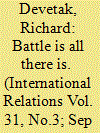

|
|
|
|
|
| Summary/Abstract |
There is an expectation today that International Relations (IR) theory ought to engage with philosophy as a meta-knowledge capable of grounding and legitimizing knowledge claims in the discipline. Two assumptions seem to lie behind this expectation: first, that only philosophy can supply the necessary meta-theoretical grounding needed; second, that theory is inherently a philosophical register of knowledge. This article treats these assumptions with scepticism. While not denying philosophy’s contribution to IR theory, the article makes the case for contextual intellectual history as an alternative mode of political and international theory. It seeks to shed light on the ‘philosophization of IR’ by depicting the broad contours of the historical and continuing rivalry between philosophy and history in the humanities and social sciences and, by reference to Machiavelli and Renaissance humanism, reminding the discipline of IR of the value of studying politics and international relations in a historical mode.
|
|
|
|
|
|
|
|
|
|
|
|
|
|
|
|
| 2 |
ID:
155786
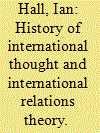

|
|
|
|
|
| Summary/Abstract |
Over the past two decades, historians of international thought have markedly improved our understanding of the disciplinary history of International Relations (IR) and its wider intellectual history. During that period, ‘contextualism’ has become a leading approach in the field, as it has been for half a century in the history of political thought. This article argues that while the application of contextualism in IR has improved our understanding of its disciplinary history, its assumptions about the proper relationship between historians and theorists threaten to marginalise the history of international thought within IR. It argues that unless the inherent weaknesses in contextualism are recognised, the progress made in the field will go unrecognised by a discipline that sees little reason to engage with its history. It suggests that historians of international thought adopt an extensively modified version of contextualism that would allow them to rebuild bridges back into IR, especially IR theory.
|
|
|
|
|
|
|
|
|
|
|
|
|
|
|
|
| 3 |
ID:
167665
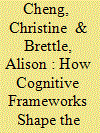

|
|
|
|
|
| Summary/Abstract |
Why do American perspectives of international relations (IR) continue to hold sway over an increasingly diverse discipline? What actually constitutes “Americanness” in IR? Who is considered “American” in IR? These are the central questions we explore in this essay. Drawing on cognitive and behavioral insights from social psychology, we argue that there is a distinct “American approach” to international relations and security studies and that this approach is a product of Western cognitive frames. We identify three factors that represent the American approach's hyper-Westernized framing: individualism, equality, and a preference for causal rather than contextual analysis, and a preference for egalitarianism. We argue that these are reinforced by two social identity processes—academic identity and national identity. The consequences of “being American” in IR and security studies suggest not only problems of attention and accuracy, but an inherent failure to appreciate that Western—and particularly, American—ways of seeing and valuing the world are not universal.
|
|
|
|
|
|
|
|
|
|
|
|
|
|
|
|
| 4 |
ID:
155791
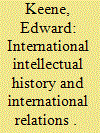

|
|
|
|
|
| Summary/Abstract |
This article reviews contextualist methods in intellectual history and discusses some of the specific challenges involved in their application to the study of International Relations (IR) and hence international intellectual history. While the broad thrust of these developments has been highly positive, the article argues that a distinction between classic and lesser works is a crucial part of the apparatus of the contextualist approach, which poses a problem in IR, where the idea of an established canon of great works has historically been less well developed than in the study of Political Theory or Law. As a result, the move towards contextualist methods of interpretation can force authors to restrict their focus onto a newly conceived, and somewhat narrow, canon, with a strongly political and legal flavour. The eclectic range of earlier, albeit less methodologically sophisticated, histories offer considerable resources for defining the scope of new empirical enquiries in international intellectual history, and the article concentrates on early modern journalism as an example of this opportunity.
|
|
|
|
|
|
|
|
|
|
|
|
|
|
|
|
| 5 |
ID:
155784
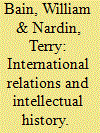

|
|
|
|
|
| Summary/Abstract |
The history of international thought has traditionally focused on a limited number of canonical texts. Such an approach now seems both naive and parochial. International Relations scholars often read their own ideas into these texts instead of getting ideas from them – ideas that if properly understood have the potential to undermine theirs. By ignoring non-canonical texts, we overlook resources that are not only necessary to establish the historical contexts of canonical writings but that can also help theorists of International Relations to understand their subject better. Judgements of what is and is not canonical are in any case themselves context-bound and contestable. Intellectual history can help us understand how the International Relations canon was constructed and for what purposes. It can also counter the abstractions of theory by reminding us not only that theories are abstractions from the activities of people living in particular times and places but also that our own theories are embedded in historicity. In these and other ways, paying attention to intellectual history expands the repertoire of ideas on which International Relations theorists can draw and against which they can measure their conclusions. The articles in this issue illustrate these points in relation to a wide range of texts and contexts. They suggest that whether one approaches international relations from the angle of description, explanation, policy or ethics, knowing how past thinkers have understood the subject can lead to better informed and more robust scholarship.
|
|
|
|
|
|
|
|
|
|
|
|
|
|
|
|
| 6 |
ID:
155788
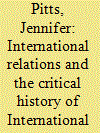

|
|
|
|
|
| Summary/Abstract |
Just as the contemporary global structure is a product of nineteenth-century economic and political developments, namely, industrial capitalism and global empires dominated by European metropoles, a misleading conception of the international system as composed of formally equal sovereign states is a product of the same period, as Vattel’s conception of states as equal moral persons was taken up and transformed in the early nineteenth century, especially in imperial Britain. This model continues to shape interpretations of global politics in International Relations (IR), despite the persistence of the imperial legacy in the form of a stratified globe. Historical work informed by postcolonial studies and recent scholarship in International Law can give IR greater analytical and critical purchase on the current global order.
|
|
|
|
|
|
|
|
|
|
|
|
|
|
|
|
| 7 |
ID:
188313
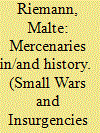

|
|
|
|
|
| Summary/Abstract |
The history of the mercenary seems little less than the history of organized warfare itself. From the dawn of recorded history to the recent rise of Private Military Companies, mercenaries appear as a historical constant that allows scholars to make grand historical claims about the organisation of force within world history. This article cautions against this view, arguing instead that the analysis of this actor has been compromised by the failure to adequately historicise and contextualize the concept of the mercenary due to the uncritical acceptance that mercenaries are a trans-historical occurrence. Informed by a historicist contextual approach, I show how two foundational characteristics of the mercenary concept, a Westphalian understanding of ‘foreignness’ and a modern account of ‘self-interest’, were absent in the periods preceding the 18th century. I demonstrate this absence through an analysis of ‘mercenaries’ in Ancient Greece and the Middle Ages, exposing how the problematization of these actors within their own historical context displays a radical difference if compared to our contemporary understanding of the mercenary. In doing so this article raises awareness to the historical specificity of this seemingly universal concept and cautions against the uncritical backward projection of this concept into the past.
|
|
|
|
|
|
|
|
|
|
|
|
|
|
|
|
| 8 |
ID:
115265
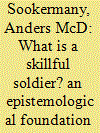

|
|
|
|
|
| Publication |
2012.
|
| Summary/Abstract |
How do we understand military skill/skills, what is it to be militarily skilled, and how do we acquire military skill/skills? Answering these three questions is essential to understanding the ongoing military transformation of developed Western countries. Universalism and contextualism (two competing ethical/epistemological positions) are used to sketch out a typological framework for explaining how different military paradigms/concepts treat "good" soldiering. Universalism is strongly connected with the traditional military paradigm of static invasion-based defense, while contextualism is connected to flexible expeditionary force-based defenses of the twenty-first century. Transformative changes over the past decade illustrate the value of the contextualist paradigm, suggesting that the universalist paradigm may no longer be useful for a twenty-first century expeditionary force.
|
|
|
|
|
|
|
|
|
|
|
|
|
|
|
|
|
|
|
|
|